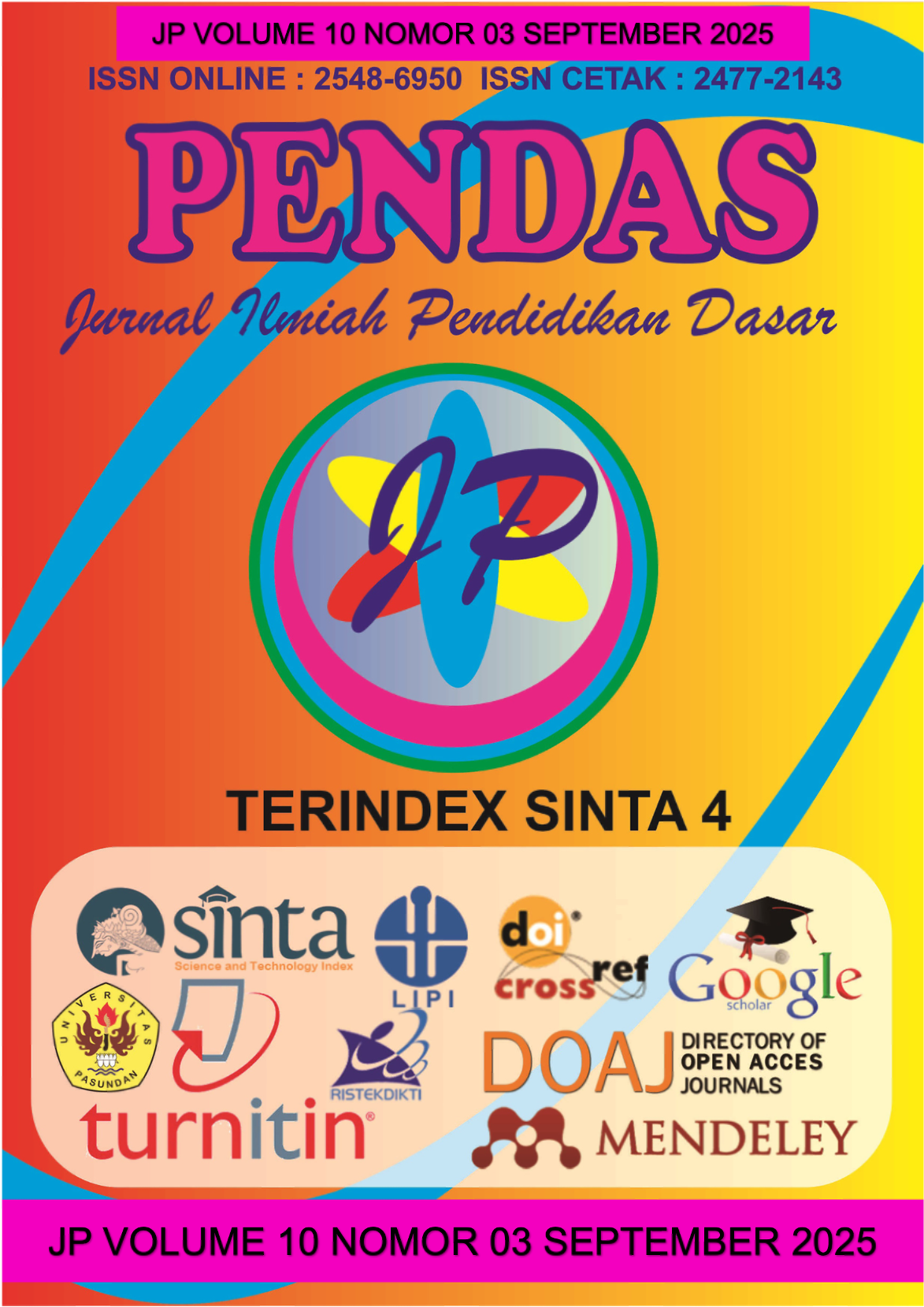THE EFFECT OF INTERACTIVE MAD LIBS ACTIVITIES ON VOCABULARY MASTERY OF 8 th GRADERS IN UPT SPF SMP NEGERI 40 MAKASSAR
DOI:
https://doi.org/10.23969/jp.v10i03.31587Keywords:
Vocabulary Mastery, English Language Learning, Contextual Learning, Pre-experimental DesignAbstract
This study aims to determine the effect of Interactive Mad Libs Activities on
improving students' vocabulary mastery in English learning. The research was
conducted at UPT SPF SMP Negeri 40 Makassar with the subject of class VIII
students. This study used a pre-experimental design with one group pre-test and
post-test. The instrument used was a vocabulary multiple choice test of 20
questions given before and after treatment. The treatment was conducted in four
meetings through Interactive Mad Libs Activities with contextual stories that
required students to fill in the blanks according to certain word classes such as
nouns, verbs, and adjectives. The data from the pre-test and post-test were
analyzed quantitatively using SPSS, including the calculation of the mean value,
standard deviation, and paired sample t-test. The results showed a significant
increase in students' vocabulary mastery, with an average pre-test score of 51.29
increasing to 81.14 in the post-test. The paired sample t-test results showed a
significance value of 0.000 < 0.05 which means there is a significant difference
between the pre-test and post-test scores. The findings prove that Interactive Mad
Libs Activities is effective in helping students learn, remember, and use vocabulary
in a fun and meaningful context, and can be used as an alternative interactive and
engaging English vocabulary learning strategy.
Downloads
References
Dorsch, T. E., Hardiman, A., &
Vierimaa, M. (2021). Developing
an Organizational Mission
Statement in Youth Sport:
Utilizing Mad Libs as a Novel,
Shared Leadership Approach.
Journal of Sport Psychology in
Action, 12(3), 143–154.
https://doi.org/10.1080/21520704
.2020.1798576
Fitriani, N., Usman, N., Asrifan, A.,
Posi, T., & . S. H. (2022). The
Implementation Of Semantic
Mapping To Improve StudentsVocabulary Mastery. La Ogi :
English Language Journal, 8(2),
150–155.
https://doi.org/10.55678/loj.v8i2.6
86
Hossain, N., Krumm, J.,
Vanderwende, L., Horvitz, E., &
Kautz, H. (2020). Filling the
blanks (hint: Plural noun) for Mad
Libs® humor. EMNLP 2017 -
Conference on Empirical
Methods in Natural Language
Processing, Proceedings,
638–647.
https://doi.org/10.18653/v1/d17-
1067
Mesmer, H. A., & Rose-McCully, M.
M. (2018). A Closer Look at
Close Reading: Three Under-the-
Radar Skills Needed to
Comprehend Sentences.
Reading Teacher, 71(4),
451–461.
https://doi.org/10.1002/trtr.1639
Rachmah, A. (2023). Kesulitan
Penguasaan Kosakata Bahasa
Inggrispada Siswa Sekolah
Dasar. Karimah Tauhid, 1(2),
288–294.
Runtuwene, A., Lotulung, L. J. ., Siwi,
G. A., Karauwan, M. G., &
Sompotan, F. M. (2021). English
vocabulary mastery training for
early childhood at kelurahan
karombasan selatan. Acta Diuma
Komunikasi, 3(4), 1–8.
Ruzmetova, M., & Kayumova, G.
(2020). the Role of Teaching
Vocabulary Competence in
English. Academic Research in
Educational Sciences Volume,
1(2), 2181–1385. www.ares.uz
Santika, I. D. A. D. M., Putri, I. G. A.
V. W., Sudipa, M. H. D., &
Diantari, N. P. A. (2022). English
vocabulary mastery to introduce
international local wistom.
Dinamisia : Jurnal Pengabdian
Kepada Masyarakat, 6(4),
915–924.
https://doi.org/10.31849/dinamisi
a.v6i4.10014
SARI, A. S. P., & Pandiangan, S. R.
(2021). the Application of
Guessing Strategy To Improve
Students’ Vocabulary Mastery on
English Phrasal Verbs. Jurnal
Suluh Pendidikan, 9(1), 24–38.
https://doi.org/10.36655/jsp.v9i1.
524
Sulistiana, E., Nadzifah, W., & Arifin,
M. S. (2019). Intensive English
Program (IEP) Meningkatkan
Penguasaan Vocabulary. Jurnal
Studi Guru dan Pembelajaran,
2(3), 236–240.
https://doi.org/10.30605/jsgp.2.3.
2019.46
Yuana, N. P., Muliani, N. W., &
Wedhanti, N. K. (2021).
Improving English vocabulary
listening using Strategi
Crossword Puzzle. Indonesian
Gender and Society Journal,
2(1), 18–26.
https://doi.org/10.23887/igsj.v2i1.
39582
Yuldasheva, K., Meyliyeva, D., &
Farxodova, D. (2023). Interactive
Methods of TeachingVocabularies for Primary Paper /
Article Info. 1(4), 146–150.
Downloads
Published
Issue
Section
License
Copyright (c) 2025 Pendas : Jurnal Ilmiah Pendidikan Dasar

This work is licensed under a Creative Commons Attribution 4.0 International License.



















